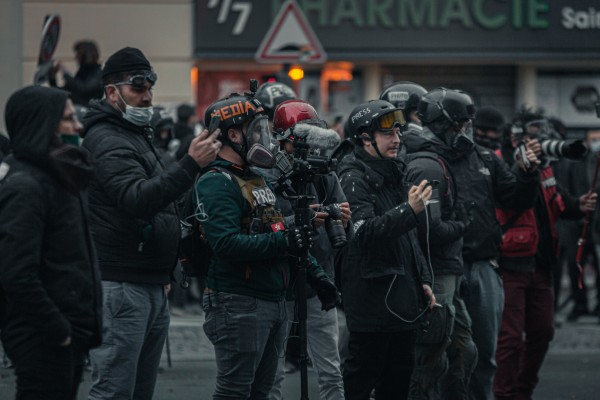The offices of a French satirical magazine were attacked on Tuesday night after the publication featured a cartoon of the prophet Muhammad on its cover. Some news reports suggested that the magazine had not yet been distributed.
According to news reports, a petrol bomb was thrown through the window of Charlie Hebdo’s Paris headquarters around 1 am, starting a fire that destroyed much of the publication’s computer system and gutted its office space. No injuries were reported.
The magazine had ‘invited’ Muhammad to be the guest editor for a special edition (called ‘Charia Hebdo’ in French, in a play on ‘sharia’ law – which is founded on a fundamentalist interpretation of Islam) focusing on the victory of a moderate Islamist party in Tunisia’s recent election. The cover design portrays a cartoon likeness of the prophet saying in French, “100 lashes if you don’t die laughing.”
Charlie Hebdo’s editor-in-chief, Stephane Charbonnier, told news outlets that all of the publication’s equipment “has been destroyed or has been melted”. He called the attack the work of “idiot extremists” and said: “If we can poke fun at everything in France, if we can talk about anything in France, apart from Islam or the consequences of Islamism, that is annoying.”
French police said that they were investigating the attack, which newspaper staff said had been preceded by threats on Twitter and Facebook. Depictions of Muhammad are generally prohibited under Islamic law and considered highly offensive to many Muslims.
Le Monde additionally reported that Charlie Hebdo’s website was hacked Wednesday morning. The magazine’s home page had been altered to display an image of the Grand Mosque in Mecca accompanied by the slogan, “No God but Allah”.
French Prime Minister Francois Fillon vowed that those responsible would be found, Reuters reported. “Freedom of expression is an inalienable value of democracy and any incursion against press freedom must be condemned with the utmost force. No cause justified violent action,” he said in a statement.
According to the magazine, the ‘Sharia’ issue was intended as a mock celebration of the success of Tunisia’s Ennadha party in last week’s parliamentary vote. A guest editorial on page three, which the magazine satirically attributed to Muhammad, claims that the party planned to impose Islamic law in Tunisia. Page two consists of a cartoon strip called ‘Sharia Madame,’ featuring burqa-clad women. The back cover depicts a red-nosed Muhammad with the words, “Yes, Islam is compatible with humour,” AFP and other news sources reported.
Mr. Charbonnier denied singling out Islam for satire, saying that his publication was simply “doing its job as usual,” according to various sources. The BBC reported that Charlie Hebdo has a “long track record of irreverence to all religions”.
This is not the first time a depiction of Muhammad has appeared in Charlie Hebdo. In 2008, a French appeals court dismissed a suit brought by two prominent French-Muslim organisations after Charlie Hebdo published a cartoon of the prophet, crying, on its cover two years earlier. The title “Muhammad overwhelmed by fundamentalists” was accompanied by the cartoon’s lamenting, “It’s hard to be loved by jerks.”
In that same issue, the magazine also reprinted 12 cartoons of the prophet that had originally appeared in a Danish newspaper, Jyllands-Posten. Those images, drawn by Kurt Westergaard, sparked an outcry in the Muslim world and led to the bombing of the Danish embassy in Pakistan.
Mohammed Moussaoui, head of the French Council for the Muslim Faith, one of the parties to the 2006 lawsuit, condemned the attack and told AFP that this week’s edition “wasn’t of the same order” [as the 2006 issue]. The Association of Imams in France called the bombing an “inadmissible act”, Reuters reported.
Mr. Charbonnier told Reuters that Charlie Hebdo would not be deterred from its work. “There is no question that we will give ground to the Islamists,” he said. “We will continue.” He added that the magazine was looking for temporary office space to be able to put out the next edition of the weekly paper. News sites reported on Wednesday afternoon that the left-wing paper Liberation was offering to house Charlie Hebdo for the time being.
The International Press Institute (IPI) would like to recall the European Court of Human Rights’ (ECHR) 1976 decision in the case of Handyside v. United Kingdom. The Court ruled that freedom of expression applies “not only to ‘information’ or ‘ideas’ that are favourably received or regarded as inoffensive or as a matter of indifference, but also to those that offend, shock or disturb the State or any sector of the population.”
IPI Press Freedom Manager Anthony Mills said, “IPI affirms the spirit of the ECHR ruling and urges that any reaction to controversial journalism be taken up within the boundaries of the law. We emphasize that violence is not an acceptable recourse for those offended by media content.”


